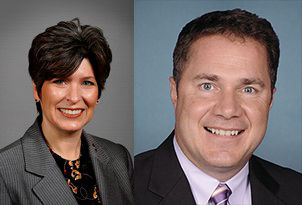Empty seats, senate midterms provide chance to change balance of power, policy

Joni Ernst and Bruce Braley are running for the U.S. Senate.
October 21, 2014
The upcoming midterm elections this November have the possibility to shake up the balance of power in the U.S Senate.
According to polling indexed and averaged by Real Clear Politics, 11 seats open this November could flip from Democrat control to Republican control, or vice-versa.
Out of the 11 seats, Democrats currently hold eight from Alaska, Arkansas, Colorado, Iowa, Louisiana, Michigan, New Hampshire and North Carolina. Republicans currently hold the other three seats from Georgia, Kansas and Kentucky. Republicans need a net gain of six seats to win the majority in the Senate.
David Andersen, assistant professor of political science, said voters want change.
“Typically in the United States, people are always upset with politics. At any given point most people in America are frustrated with our political system and our lack of ability to get things done,” Andersen said. “Right now, we’re at a high point. We have not seen people so upset probably since the 1960’s with Watergate.”
Andersen said that voters typically will support the opposing party of the President, so the party out of power benefits in a midterm election. At this point, he said, Republicans gain to benefit from voter dissatisfaction.
Polling shows the majority of races are too close at this point to favor a winner. Mack Shelley, ISU political science professor, said because of the close races, Iowa’s U.S. Senate race could determine the balance of power. If the majority party flips, it could lead to changes in policy pursued by the Senate.
“[Republicans] like the Keystone Pipeline, that would impact Iowa directly because a chunk of it runs through here,” Shelly said. “Republicans in general don’t like environmental legislation, they’ll want to get rid of the EPA altogether, or dramatically scale back its powers.”
Shelley also noted that even with a Republican controlled Senate, Democrats will still control the White House. President Obama will have the power to veto anything passed with a Republican congress.
“Increasing the minimum wage sounds like something that would be pretty much dead on arrival [with Republican majority],” Shelly said. “Another that isn’t dead on arrival, but Republicans seem to oppose pretty fiercely is immigration reform.”
Andersen said to expect more gridlock unless Republicans can start to work with the President. The House and Senate will need to work together and nothing will get done if Democrats act like Republicans have the last few sessions, blocking and filibustering almost all legislation, Andersen said.
Recent polls in Iowa are close, but polling from The Des Moines Register, Public Policy Polling and NBC News have shown Ernst leading by as much as six points. A CBS/NYT poll showed Braley leading only by one point at the beginning of October, and another polling from FOX News, Rasmussen and Loras College have shown the race a tie.
“You do get the sense, depending on what poll you look at, that the race is either dead even or Ernst is little bit ahead,” Shelley said. “It’s been awhile since Braley has had any daylight between himself and Ernst. At this point, Braley is going to have to build a lot more momentum if he’s going to be able to pull this off.”
Andersen said the race will come down to who can get more people on the ground before election day. Outside groups and spending big, Andersen said, but Ernst may have a disadvantage on motivating new voters to support her.
The most vulnerable seat on the Republican side is in Kansas where Sen. Pat Roberts is running for his fourth term.
“Kansas is sort of a deep red state if you go by the usual colorization by county,” Shelley said.
Chad Taylor, the former Democratic nominee, was successful in pulling his name off the ballot. Greg Orman, an independent candidate, is now the official opposition to Roberts.
“Pat Roberts has kind of been in trouble for a long time. He claims household in the state, but it’s really his friends’ and he doesn’t really live there. Part of the argument is that he’s ‘Gone Washington’ or he’s ‘become one of them’ and isn’t ‘one of us’ any longer.”
The RCP average for Kansas has it at a dead tie, the closest of any race this cycle. Specific polls have shown Roberts up by five and Orman up by as much as 10 percent in the past few weeks.
If Orman wins, he will choose a side to caucus with for the purposes of meetings and committee assignments. Andersen and Shelley said an Independent like Orman might also be able to shake up the balance of power if he wins and either side only has a majority by one seat.
As for the other seats, Republicans are currently leading in polling in Alaska, Arkansas, Colorado, Georgia and Kentucky. Democrats lead in Michigan, New Hampshire and North Carolina. Polling in these states show the races very close, so voter turnout will be the deciding factor.
South Dakota, was favored to be an easy Republican pickup, but recently, the Democrat and Independent in the race have started to pick up gains in the race.
Two other open seats, Montana and West Virginia, are heavily favored to go Republican on election day Nov. 4.
There are also 25 other U.S. Senate elections this November. Those seats are not in play and are safe for each party.






